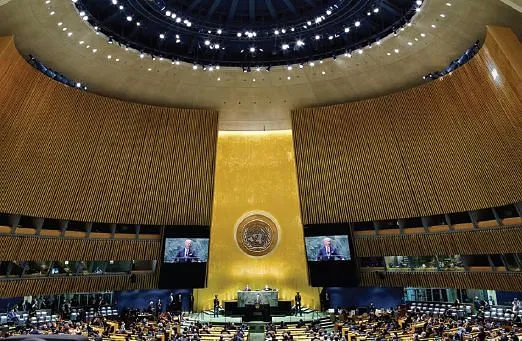The 77th session of the United Nations General Assembly (UNGA) began on September 13th in New York. A new UNGA session traditionally begins on the second Tuesday of September every year and so it did this year.
The ‘High Level’ segment of a new UNGA session also traditionally begins a week later, i.e., on the third Tuesday of the month and it is therefore scheduled to commence on September 20th.
On that day the US President travels to UN Headquarters in New York to address the UNGA as the second speaker; the first is always the head of the Brazilian delegation.
Naturally, all eyes will be on US President Joe Biden and his message to the international community. But before an anticipation is made of the focus of what Biden may say some welcome news has come on the Covid pandemic front just as the UNGA’s 77th session has begun.
In a media briefing on September 14 the Director-General of the World Health Organisation Tedros Ghebreyesus said “Last week the number of reported deaths from COVID-19 was the lowest since March 2020.
We have never been in a better position to the end the pandemic. We are not their yet but the end is in sight…We are in a winning position…If we don’t take this opportunity now, we run the risks of more variants, more deaths, more disruptions, and more uncertainty”.
Ghebreyesus words express what can be called “cautious optimism” and his warning that governments must let theirs and urge their peoples not to let their guards down is correct and timely.
It was on March 11 in 2020 that WHO declared the new corona virus which had begun in Wuhan, China in November/December of 2019 as a pandemic.
The Chinese had only brought the new corona virus to the WHO’s attention on December 31st 2019. They were tardy in doing so, and even after that, they did not cooperate fully with the WHO in sharing information on the new deadly disease.
On its part, the WHO was justifiably blamed for treating China with kids gloves on the issue. It can be argued that had China and the WHO leadership acted with greater urgency and openness the international community may have geared itself better in the initial stages itself to handle the disease.
The Covid pandemic has caused such vast and multi-dimensional damage to countries and peoples that its full extent will take time for social scientists to assess. Yet today it is hardly a priority for either governments or peoples.
They seem to be taking it in their stride and while national health authorities continue to be vigilant global political leadership seems to have moved to different concerns which will be reflected in the speeches of leaders in the High-Level segment of the UNGA.
The only outlier on the Covid front is China which is following a zero-Covid policy and locking down cities. By doing so it is not only disrupting its own economy but also global supply chains. On the whole all leaders can be expected to urge the international community to maintain serious vigilance on Covid 19 but these statements will be more routine than anything else.
Their real focus will be on situation that has emerged from Russia’s invasion of Ukraine and the continuing global contestation between China and the West.
In recent days Ukrainian forces have been able to force Russian army units to retreat from areas held by them both in the eastern and southern Ukraine. The fact that these Ukrainian successes are taking place as the UNGA 77th session begins could not entirely be a coincidence.
It will be used by Western countries to stress that their policy of bolstering the Ukrainian army is showing up the ineptitude of Russia. It is doubtful if Ukraine will ever have the ability to force a full Russian retreat from its territory despite all the help that the West may give it.
But reverses such as have recently occurred may impact President Putin’s standing within his own people and a prime aim of the West is to dent his image in Russia and the wider world.
Biden can also be expected to speak on China, inter-alia, on the human rights issue. The recent report of the United Nations High Commissioner for Human Rights on China’s treatment of Uighur Muslims is a most severe indictment of the way it continues to treat the Uighurs including through a denial of their religious rights.
The Chinese have naturally dismissed the report as a distortion of facts. What will be interesting to observe during the High-Level segment is the number of leaders who refer to China’s treatment of the Uighurs.
It is likely that most, barring the Western leaders, will refrain from referring to it though during the course of deliberations on human rights issues some countries may make general references.
In particular, the approaches of the OIC countries approach on the Uighur issue will bear watching.
External Affairs Minister S Jaishankar is expected to lead the Indian delegation to the 77th UNGA High Level segment.
His address is likely to tread the cautious approach on the Ukraine issue that India has pursued so far. He will call for dialogue and urge that sovereignty and territorial integrity should be always respected.
It is probable that the US will attempt to make India go further in indicating its unhappiness with the Russian move. But for India the greater focus will have to remain on China and what Jaishankar will say on the Chinese policies in the Indo-Pacific region and more particularly on the LAC, notwithstanding the recent disengagement of forces at some points will be of the greatest interest.
Disclaimer: The views and opinions expressed in this article are the personal opinions of the author.
The facts, analysis, assumptions and perspective appearing in the article do not reflect the views of GK.







